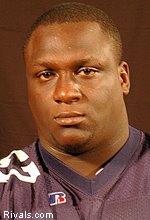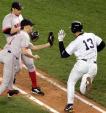 Jerrell Powe, a prized football recruit for the University of Mississippi, has secured an important court victory in his quest to gain NCAA eligibility. Here's the story: Powe, rated as the country's top defensive tackle prospect and a top 25 overall prospect, is a learning disabled student who has played at Wayne County High School in Mississippi and also Hargrave Military Academy in Virginia (coincidentally, the same school where former NBA player Korleone Young, who I often write about, attended). But Powe received some bad news last week, when the NCAA declared him ineligible due to insufficient academics: he had to obtain a 2.50 GPA in "14 core high school classes" and a 17 on his ACT and while Powe scored an 18 on his ACT and finished with a combined high school GPA of 2.54, the NCAA apparently believes that Powe's GPA reflects too many correspondence classes at Brigham Young University, and also "too many irregularities in his high school course work and transcripts." The NCAA also alleges that Powe has repeatedly refused to "clarify" certain questions that it has about his course work.
Jerrell Powe, a prized football recruit for the University of Mississippi, has secured an important court victory in his quest to gain NCAA eligibility. Here's the story: Powe, rated as the country's top defensive tackle prospect and a top 25 overall prospect, is a learning disabled student who has played at Wayne County High School in Mississippi and also Hargrave Military Academy in Virginia (coincidentally, the same school where former NBA player Korleone Young, who I often write about, attended). But Powe received some bad news last week, when the NCAA declared him ineligible due to insufficient academics: he had to obtain a 2.50 GPA in "14 core high school classes" and a 17 on his ACT and while Powe scored an 18 on his ACT and finished with a combined high school GPA of 2.54, the NCAA apparently believes that Powe's GPA reflects too many correspondence classes at Brigham Young University, and also "too many irregularities in his high school course work and transcripts." The NCAA also alleges that Powe has repeatedly refused to "clarify" certain questions that it has about his course work.In fairness to the NCAA, remember the context of its thinking here: it has been harshly criticized in recent months over "diploma mills" that enable high school football prospects to radically improve their GPAs, including by taking un-timed exams that they grade themselves (see our blog's coverage of Florida's infamous "University High School"). Having said that, there is no apparent evidence that Powe has received that style of "schooling" on his way to a 2.54 GPA. But still, the NCAA is probably uniquely sensitive to the topic of academic standards at this time.
But the NCAA may not have the final word. For one, Ole Miss doesn't want to lose one of its top recruits, so it immediately filed an appeal with the NCAA on behalf of Powe.

But Powe isn't waiting for the appeal to be heard. Instead, he has hired a lawyer: Attorney James Carroll (right) of Carroll, Warren & Parker in Jackson, Mississippi. And the move appears to be a good one, as several hours ago, Carroll secured a temporary restraining order requiring that Ole Miss enroll Powe. Here's the story from Robbie Neiswanger and Rusty Hampton in the Clarion Ledger:
Lafayette County Chancery Court Judge Edwin Roberts Jr. said Ole Miss must allow Powe to enroll in school by Friday — the final day students can enroll for the fall semester. Roberts also said in court papers that because Powe has met the NCAA’s minimum requirements for academic eligibility, Powe should be placed on athletic scholarship and be allowed to practice with the team, in accordance with NCAA rules and the binding scholarship papers Powe and the university signed in February.So what will Ole Miss do: follow the NCAA or follow Judge Roberts? Although the University has no comment (other than "it's an unprecedented situation"), I think the answser is fairly obvious: follow the judge. Not matter how much the NCAA likes to flex it's muscle, it can't expect Ole Miss to pick it over a judge and face contempt of a court order.
**Please See 9/17/2006 Update: Jerrell Powe Drops Lawsuit Against Ole Miss: Where Will He Now Play Football?

















